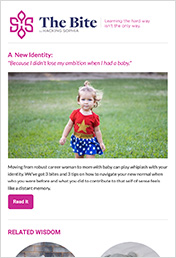Why is it so damn hard to be a working parent these days? One HUGE reason is that managing a career and raising kids are often in direct competition with one another. The roots of the problem stem back to the 1950s. Back when men went to work and women stayed home, the “ideal worker” was someone totally dedicated to their job over other aspects of life, which demanded radical compartmentalization of home and work.
We first make our habits,
and then our habits make us. John Dryden, English Poet
Though gender lines have shifted and initiatives have started to blur the line between our work and family lives (e.g. on-site childcare, social activities that include family), that notion of the “ideal worker” still looms. Pre-kids, that “ideal” felt more attainable. Our time was more elastic and our outside responsibilities more limited. In striving to achieve that ideal, many of us also began to develop behaviors that were rewarded and drove success early in our careers. We advanced. Then we had kids. Our time became less elastic and our responsibilities grew. And almost by definition our ability to be “ideal workers” got a gut punch. Now we live with a chronic tension between our personal and professional worlds, a tension driven by intense time pressure and stress.
How do we adapt to this situation? Many of us cope by holding onto old familiar behaviors and assumptions from earlier in our careers and before kids, that might no longer drive success or be sustainable today. How do we break free from these professional Supposed To’s that might be holding us back – not necessarily from becoming an “ideal worker,” but from getting what we want and deserve in our careers?
I’ll never forget an early moment in my career when I was in a high profile situation and I was asked and able to answer the CEOs pretty obscure question accurately. Since that day, I took it on to be the one who had control of all the facts. It killed me. I spent far too much time making sure I knew it all, rather than elevating how I delivered value. A Sophia
We’ll bring awareness to how our past successes might condition us to behave in “old ways” and how we can subtract them in our careers. Think of it as professional un-conditioning.
What To Do (Bites)
-
We auto-pilot instead of big picture
Psychologist and economist Daniel Kahneman who won the Nobel prize for his work in the psychology of decision making wrote about the dual systems of our brains – System 1 and System 2. (If it sounds familiar, you probably read or heard about his bestselling book, “Thinking, Fast and Slow.”) System 1, fast thinking, operates automatically with little to no effort. System 2 is slower, more deliberate and effortful. It’s what’s required for strategy and deep thinking. When we’re time crunched and stressed, we all have a tendency to operate in System 1 or autopilot. This saves us time and energy, but it also means we get glued to habits and patterns from our past experience that might no longer serve us well given our new circumstances.
-
Behavioral anchors hold us back
As we advance professionally, we get rewarded for certain behaviors. It’s seductive to hold onto these behaviors because they previously resulted in rewards. And, we sometimes define ourselves by those behaviors e.g. “I’m the one who…” But when a work situation changes – a new role or a new organization – these behaviors may become anchors that hold us back rather than sails that propel us forward. Oftentimes our adaptations lag our progression, resulting in carrying over old behaviors months or even years into our new role.
Consider an example: as an entry level employee, we are praised for our ability to get the job done. Great. But that sole-contributor orientation might no longer serve us in manager roles when the emphasis should be more on leadership and enabling others.
So, instead of making past behaviors deep habits, figure out instead what drives success in your organization and in your current role, in the current environment, and create NEW (more relevant and career-advancing) patterns.
-
Assumptions make an ass…
We make myriad assumptions around how we can and should function within organizations and relationships. Some of the assumptions we make are based on clearly laid out and documented expectations. We are told that our compensation depends on achieving X goals. Some are shaped by organizational culture: “you shouldn’t take more than X months of parental leave or your career will be sidelined.” Some are based on perceptions: “If I talk about my kids at work, people will think I’m less committed.” Assumptions can weigh you down and impede your success and/or happiness. Seeking proof or clarity to substantiate these assumptions will save a lot of time and energy.
Tips
-
Help yourself to see the anchors that weigh you down. We got a start in Module 2, Professional Supposed To’s. Hold on to that list, listen to what others in your session said about their habits too, as you might see your own in there. Start to create a list of the habits and ways you work. How would you describe your work style? How would you define what made you successful thus far? Capture what you believe to be true about what has helped you get to where you are today.
Just like your Personal Supposed To’s, making your behaviours visible (and seeing the list) helps you to ‘see’ the habits you rely on.
-
Compare your list with how others see your operating habits. Selecting the right people and giving them clear direction is important. You want someone who can be honest and whose opinion you trust. Give them very clear direction that you’re looking to understand what they see as facilitating your success in the role you have, and what might be holding you back. It’s important to frame the feedback as recognizing what worked well for you previously, which may not be as productive or effective for you now.
Listen really hard without a gut “oh, that’s not me” or thinking to yourself “they don’t really get what’s required.” What are they really saying? Ask for examples to bring clarity for you.
Then have a face-to-face with yourself. Ask yourself: are these habits and ways of working draining time and energy? Are they getting in the way of you achieving what is truly valued in the organization? Remember, you don’t have to rewrite everything right away. Try things out.
And, remember, be appreciative and supportive of their feedback. Having a trusted resource in your career whose opinion you value and can guide you is invaluable. You’re asking them to do something potentially risky. Don’t punish the messenger!
-
For assumptions, clarify if what you’re assuming is true is really rooted in truth or if it is fiction. Are they still relevant or a ‘no longer relevant carry forward’ from the past? Depending on the assumption, it could be checked with your boss, mentors or colleagues whose opinion you trust. And, you can also always test the waters – do micro-experiments where the assumption is breached in a low risk way to solicit reactions from others.




